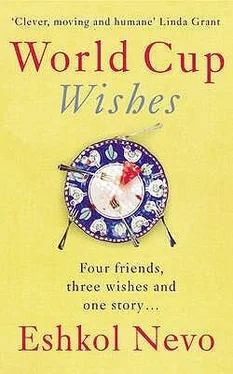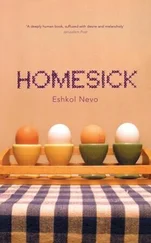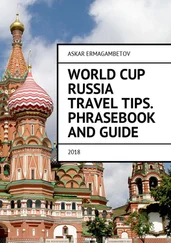Maybe he had emergency surgery, Ofir tried to come up with a reason.
There’s nothing … nothing that should have kept him from coming out to talk to me … he couldn’t find someone to take over for him for a minute?
We didn’t say anything. A cold wind came in from the open balcony door, but no one got up to close it. The wind chimes that Maria had made for Ilana for her last birthday tinkled lightly.
But you know what? That’s how it is, Amichai said after a long moment, and his tone was more measured now. That’s how it is with public health. The patient is a nuisance. And the people who come with him are a disaster. You should have seen it. There was an Ethiopian family sitting in the corridor with me. They didn’t know Hebrew, so even when someone finally came to talk to them, they didn’t understand. How can it be that not even one person in the entire hospital speaks Amharic? Isn’t that outrageous?
We nodded. We didn’t dare take the chance of giving any other response.
You know, he went on, his eyes blazing, everything depends on the doctors’ good will. And it’s not that doctors are necessarily bad people. But the conditions they work under, the long shifts, the fatigue. A doctor goes to school for twelve years to get his licence, and in all those years, he doesn’t get any training in how to deal with patients on an emotional level. So for some, it comes naturally, and for others, it doesn’t. That’s how it is. Instead of being, well, a basic principle, it becomes a game of roulette. Which doctor just happens to be on duty when you come in, and whether he had a good night’s sleep.
Wait a minute, I don’t understand, I said, trying to clarify things. This is an NPO that will be against the medical establishment or for it? And what does it have to do with cosmetic surgery? It’s a whole different story, isn’t it?
You’re right, Amichai said, but his voice had lost none of its confidence. The whole thing isn’t fully formed yet. But you’re my friends, and I wanted to hear your opinion. I mean, how does it sound to you, you know, as a preliminary idea?
I didn’t say anything. On the one hand, I remembered all my severe asthma attacks and the helplessness I felt when I had to explain my condition (in as few words as possible — every word wasted valuable air) to impatient doctors. And once, they gave me the gown with the opening in the back and didn’t bother to tell me about it and I walked with it like that, open, to the nurses’ station. And there was the time when they asked me to take my medical file from one department to another, and I looked inside and saw that a doctor who had no authority to make that kind of diagnosis had written that I had ‘a slight tendency to melancholy’.
On the other hand, none of the doctors who treated me had abused me. Condescending, yes. But not abusive.
Then on still another hand, there was Amichai.
But an NPO? What do I know about such things?
I think it’s a great idea, Ofir said. It’s just what alternative medicine says, you have to treat a person holistically, not like just a collection of symptoms.
They both looked at me, waiting to hear my opinion. Even Ilana stared at me from the wall.
I think she would really like it, I said, pointing at her (and thought to myself that maybe she would be happier about an organisation to help the Palestinians at the checkpoints, but I knew there was no use bringing that up, because there was no way that Amichai, whose father had been killed by Palestinians in Lebanon, would be willing to establish that kind of organisation).
Yes, I also think she’d be for it, Amichai said and glanced quickly at Ilana’s picture, as if he was afraid that if he looked at for too long he might sink into it. And drown.
So what’s next? Ofir asked.
We meet here again in two weeks, Amichai said. Meanwhile, I’ll start a round of meetings to find out what forming an NPO entails. After all, we don’t have the slightest idea.
What about us, what’s our job?
Don’t let me give up, Amichai said. That’s all for now.
*
You think anything will come of all this? Ofir asked me when all four of us — Maria, her daughter, he and I — were on the street.
Honestly? No, I said. But what difference does it make? The main thing is that it’ll keep Amichai busy. So he won’t have time to think.
It’s a good thing he has the twins, Ofir said. It keeps his head above water. For the time being. If he didn’t have to get up in the morning for them — I don’t know what would happen to him.
Those children … Maria sighed, they’re … I don’t know.
How are they? I asked.
Nimrod’s OK, she said. He cries. He says he misses Lana. The way he should. The one who worries me is Noam. He’s too quiet. He leaves everything inside. That’s very bad for a child.
It’s very bad for an adult, too, Ofir said. Did you see how thin Amichai is? Did you notice that he didn’t touch any of the refreshments for the three hours we were there? And the blotch on his neck, did you see that the whole Galilee is suddenly gone? How can that be? And the balcony, did you notice that he opened the balcony? Only two years ago, they spent forty thousand shekels to close it off! Not to mention the puzzle, did you see the puzzle he has there? Two thousand pieces of the Titanic . The Titanic , get it? They’re all warning signs, I’m telling you. I’ve been there, in that state. He’s going through the motions, but we have to watch him all the time. Because if, God forbid, he does something to himself, we’ll never forgive ourselves.
From: ‘Metamorphoses: Great Minds who Changed their Mind’, an unfinished philosophy thesis by Yuval Freed
In April 1901, the philosopher Bertrand Russell and his spouse are staying with their friends, the Whiteheads, in their mansion in Oxford. In the evening, the Russells go out and when they return, they find, to their horror, that Mrs Whitehead is lying on the sofa in the throes of an attack of severe pain. She is curled up like a foetus, moaning. Then, she writhes for several seconds and curls up again. Russell wants to go to her, to help her. But Mr Whitehead stops him. Nothing can be done, he explains. It’s Evelyn’s heart disease. We have to wait for it to pass.
As he stands there watching the woman moaning on the sofa, Russell experiences a dramatic internal change (he himself uses the religious term ‘conversion’ when he describes the event in his autobiography). In sharp contrast to other developments his thinking had undergone over time, the conversion that occurred that night was not preceded by tightly reasoned logic; nor was it supported by precise formulas. The ground, as he himself writes, is simply pulled out from under his feet during those five minutes he stands watching Mrs Whitehead’s suffering, and suddenly — according to his own testimony — he understands everything: he understands that the human soul is infinitely alone in its pain. And that that loneliness is unbearable. He understands that the only way to penetrate and touch that private loneliness is through unconditional love of the sort clerics preach, and that any act that is not derived from such love is harmful and pointless. This leads him to the conclusion (it is amusing to see that Russell’s apparently mystic flow of thought here actually evolves logically, almost like a mathematical proof) that war is evil, that public school education is disgraceful, that all use of force is to be condemned, and that in interpersonal relations, a person must penetrate the core of another’s loneliness and speak to it.
For several months after that event, Russell felt that he had had an epiphany and that he was able to read the innermost thoughts of anyone he met on the street. Those mystic feelings faded with time, but he never forgot that moment in the Whitehead home, and he claimed that it lay at the root of his shift from imperialism to pacifism. The same Russell who grew up in a family of political conservatives and, from earliest childhood, absorbed the belief in the supreme importance of preserving the great British Empire, that same Russell who, only two years earlier, in 1899, had wholeheartedly wished for Britain’s victory in the cruel war to suppress the Boers in South Africa, became in five minutes, so he claimed, a pacifist who championed conscientious objectors, and later, preached against Britain’s participation in the First World War …
Читать дальше












